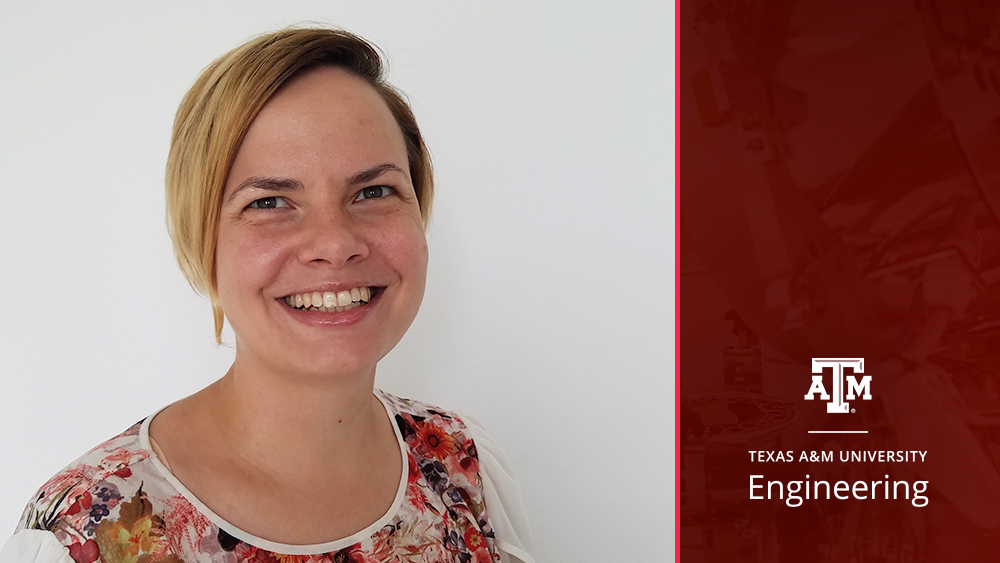
Ocean engineering research has taken Dr. Mirjam Furth, assistant professor in the Department of Ocean Engineering at Texas A&M University, around the world: Sweden, the United Kingdom, Japan, New Jersey and now, Texas.
Joining the department this semester, she is excited to bring her research and expertise to both the College Station and Galveston campus – utilizing the resources of both to give graduate and undergraduate students the opportunity for a hands-on research experience.
“What I'm really looking forward to is that we are going to do experiments in the ocean off the Galveston campus,” Furth said. “Generally, you do experiments in a controlled facility, like the Offshore Technology Research Center. But there are very few people who can do that, because these centers are expensive to run and there aren't a lot of them. Then, there is kind of a subset of people who can do free running models, which, again, requires different facilities. You need a lake or an ocean body or research vessel.”
Texas A&M ocean engineering researchers have both available.
“What we're working on now is building a free-running model, about six feet on scale, of a high-speed craft that we are equipping with sensors,” Furth said. “Then we are going to measure the pressure, the accelerations and, specifically, how it’s running. Taking my students to Galveston and going out on the boat and just doing these experiments that we have been waiting to do for a really long time is super exciting.”
Originally from Stockholm, Sweden, Furth was introduced to naval architecture and ocean engineering as a child – although she didn’t know it at the time – when her family went on sailing trips. Following this field of study through joint master’s and bachelor’s degree programs at The Royal Institute of Technology in Stockholm, she spent her final year abroad at the University of Southampton in the United Kingdom. There, she would complete her doctoral degree.
She then headed around the world. After working with the Lloyd's Register Foundation – the British equivalent of the American Bureau of Shipping – for her graduate work, Furth applied for a grant through the Japanese Society for the Promotion of Science, an organization similar to the National Science Foundation, and received a one-year postdoc fellowship.
From ocean to ocean, she made the trek across the Pacific to begin her career at Steven’s Institute of Technology in New Jersey before finding her way to the Gulf of Mexico and Texas A&M’s Galveston and College Station campuses.
With research experience in numerical and experimental hydrodynamics, Furth explained that her focus in marine design looks at how the shape of an object (such as the high-speed craft her lab is building to test in Galveston) can be changed to improve its capabilities.
“For instance, with a high-speed craft, which are planing boats, how can we make changes to the hull shape so that it moves quicker through the water or so that it reduces slamming pressures? Because if you've been on a high-speed boat as it hits the hits the waves, there is this slamming motion,” Furth said. “How can we reduce the pressure by just changing the shape?”
Another aspect of Furth’s naval architecture research is in relation to moving aquaculture farms into rougher seas to utilize wave energy converters to harvest clean energy for electricity production needed to sustain the structure. Her studies look at the configuration of the aquaculture farm and converter as well as how to dampen the motion of the structure caused by harsher wave conditions.
As she starts her research at Texas A&M, Furth said undergraduate students should not hesitate to ask to take part in research opportunities. Near the beginning of each semester, she gives an open invitation in her classes for students to join her lab and said that, despite COVID-19 and Hurricane Laura, the turnout this fall is one of the highest she’s seen.
“I was so surprised and I think that says a lot about Aggies in the ocean engineering department and how much they want to participate,” Furth said. “But I also think students should know that this is always available. So, they should ask their professors how they could be more involved in research because I think that's really something that a lot of people would enjoy.”